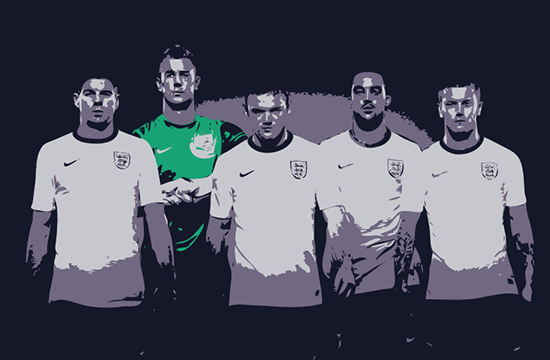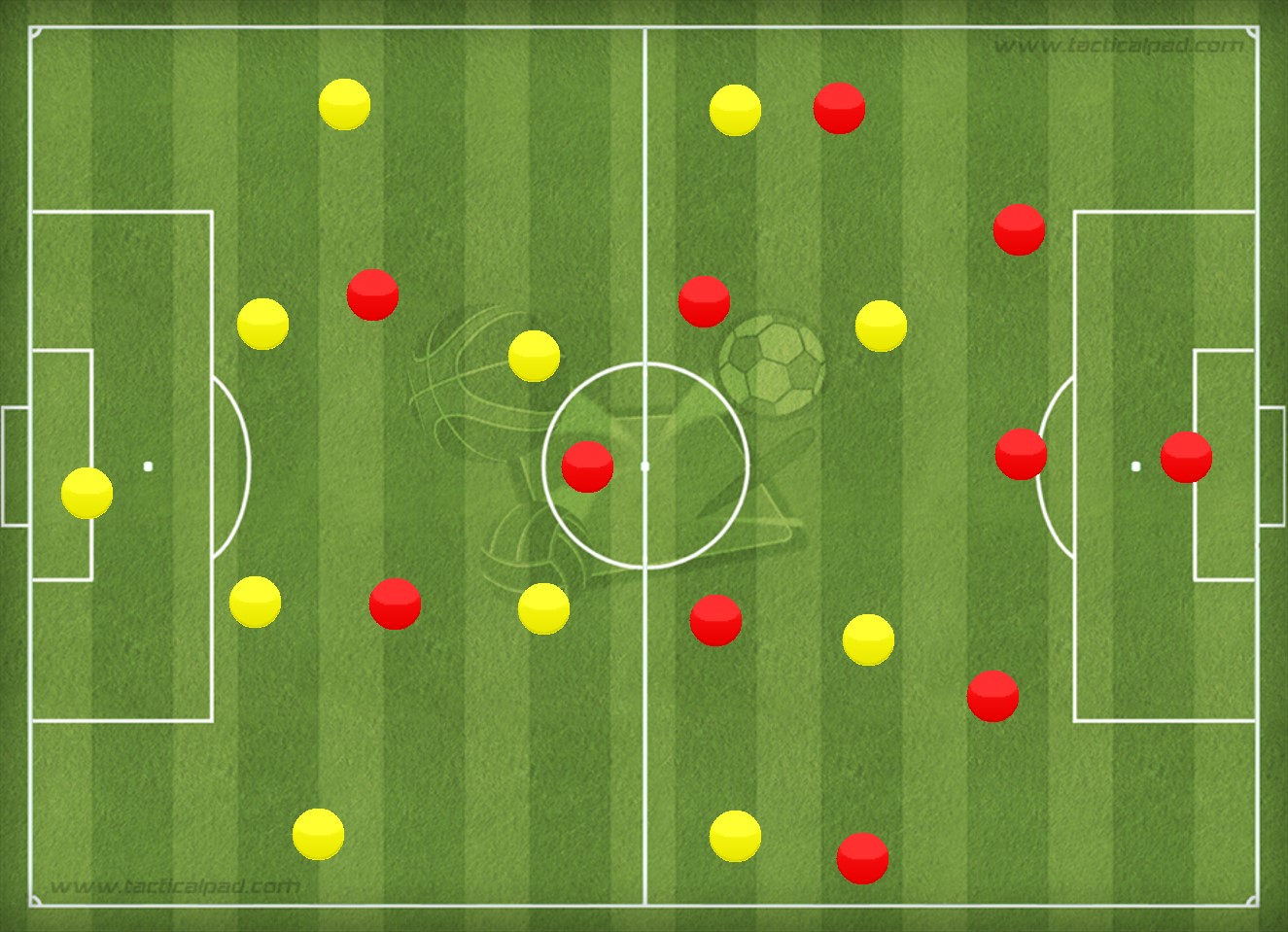It seems reasonable to assume that the dampened attitudes from the British public towards the likelihood of England being victorious at the European Championships in Poland and Ukraine in the summer of 2012 were at least partly driven by the increase in televised football from abroad. Latterly ESPN, and now BT Sport, show football from France, Italy and Germany as regularly as Sky television show football from Spain. It’s possible that the UK public’s insatiable appetite for televised football has led to the realisation from the viewers, and the printed press, that English football players aren’t as good as football players from France, Italy, Germany and Spain after all.
This general attitude has informed a similarly muted belief about England’s potential successes at the upcoming 2014 World Cup, when coupled with the performance of the side in the same tournament in South Africa in 2010.

The 2012 London Olympics, in the same summer as the aforementioned European Championships, stood in stark contrast. An acceptance from the beginning that Great Britain, even as hosts, weren’t able to win as many medals as China, Russia and the United States provided a welcome surprise when England surpassed all expectations to achieve a respectable third in the medals table (or fourth, depending on how you read the table), accompanied by superlatives in the national media along the lines of ‘super’, ‘amazing’ and ‘heroes’. These sorts of adjectives were decidedly absent when referencing the Three Lions in the broadsheet and tabloid coverage of Europe’s premier international football competition the previous month, even though the England national team stood even less chance at their tournament than those brave Olympians did at London 2012.
The acceptance of the genius of Andrea Pirlo when England were eliminated in Kiev seemed to confirm the new found belief that England do not have the individuals, or the team, that can win major international tournaments (barring a tactical master plan of Greek-like proportions). The fact that on the 24th of June, 2012, a 33-year-old Italian regista got plaudits befitting apparently only a Great British Olympian illustrates the necessary changing attitudes of the wider viewing public in the UK.
It seems the Premier League’s worldwide popularity has exaggerated the abilities of the players who are selected for the England national team, who, as well as being lambasted as overpaid, womanising, lazy, play-acting prima donnas by the fans on the terrace, are also adored, defended,and overrated in equal measure by the same individuals, to the detriment of realism when the first balls are kicked at international tournaments in a flurry of dizzying national hysteria.
With all this in mind, if we accept the somewhat flimsy premise that England are underachieving, it could be a good idea to bring forward the quadrennial root-and-branch diagnosis of England’s major problems in terms of competing on the international scene into a time when decisions are less knee-jerk, and steps are taken in a measured, even-handed manner. Greg Dyke, charged with the responsibility, is failing in his task.
The trouble is, the former Director-General of the BBC is trying to fix something that isn’t broken.Although it was sensible to appoint someone with a regional, London accent at a time when the FA are still dealing with the perception that the game is leaving (or has left?) the working-class arena with the surging cost of attending, participating and enjoying international and club football in England, when Greg Dyke was appointed Football Association chairman in March last year surprisingly little seemed to obstruct him. His appointment, unanimously approved, was driven by his tenuous background in football, from being a non-executive chairman at both Manchester United, between 1997 and 1999, and Brentford, from 2006 up until his confirmation-in-post as FA Chairman in 2013. Although Greg Dyke and his commission are acutely aware of a problem (as are we all – England aren’t as good as say, Spain), they don’t seem to know how it should be addressed, even if they are working as hard as they can to rehash terribly old, and terribly bad ideas to fix the issue.
“What none of us could have foreseen was that because of the very success of the Premier League, 20 years later we would end up with a league largely owned by foreign owners, managed by foreign managers and played by foreign players and that, as a result, it could be argued that the England set-up has been weakened, rather than strengthened, by the creation of the Premier League. Saying this I am not being xenophobic but my job is to help ensure that English football and particularly the England team is in a healthy state.”, said Greg, at his first key-note speech at St George’s Park in September 2013, having left Brentford F.C. under the management of Uwe Rösler, a German.
There is a difference between correlation and causality, Mr Dyke. Correlation does not imply causation. There is a definite correlation between retail cone sales from one of the biggest ice cream companies in the US between 1999 and 2005, and death by drowning in the same country in the same time period. As one goes up, so does the other. This does not mean that there is any causality between the two. One does not affect the other. It means it is hot, and people have gone to the beach. As we can see, there is also a correlation between global average temperature and the number of pirates in existence all over the world in the last 200 years. As the former goes up, the latter does down. This does not mean that the presence of pirates are governed by how warm it is. Again, there is no causality between the two. Similarly, there is a correlation between the number of players who are not eligible to represent the England national team playing the Premier League, and the progress made by the England national team in major international tournaments since 1992, but it does not mean there is any causality whatsoever. The presence of so-called ‘foreigners’ (a word which is surely has traction in the UK tabloids because of their thinly-veiled anti-immigration stances) has had, and is having, absolutely no bearing on the performance of the national team. Unfortunately, this false premise is the entire basis of the belief system that Greg Dyke and his randomly assembled ex-footballers pin their root-and-branch changes on.
Perhaps Greg Dyke has access to some information which states conclusively that the England national team are getting worse, other than what vastly underqualified journalists who slam the team after their elimination from tournaments in narrative-driven cliché porn, but from most acceptable and widely available information concerning England, it appears that they are getting better in every way. This, coupled with lower national expectations, gives England a very bright future indeed without Greg Dyke even needing to lift a finger.
No, Phil Jones is not Paul Pogba, and no Tom Cleverly is not Thiago Alcântara, but the England team are improving, and getting closer to the rivals that torment them so regularly with their better placed penalties. It seems that football establishments such as the Dyke-led FA Commission have a pathological fear of technology, because it apparently removes a conversation point ‘down the pub’ (believe me, after Gerrard’s slip there is still plenty to talk about ‘down the pub’), but it might serve them to utilise at least a calculator now and again. Stefan Szymanski, a widely-respected Professor of Sport Management at Michigan University, and co-author of Why England Lose: And other curious phenomena explained picked up a calculator, and managed to quantify how significantly England has improved. Unfortunately, because Stefan wasn’t a non-executive chairman at a football club, or an ex-England footballer, or looking to release an autobiography, and because Stefan had employment commitments, he was not asked to sit on the commission at the FA with Mr. Dyke. In Greg’s defence, he wasn’t ever likely to select anybody that would have disagreed with him, was he? Greg goes on, ‘In the future it’s quite possible we won’t have enough players qualified to play for England who are playing regularly at the highest level in this country or elsewhere in the world. As a result, it could well mean England’s teams are unable to compete seriously on the world stage…’.
This is wrong. Stefan Szymanski, who can speak for himself, says, ‘Since the creation of the Premier League the performance of the England team has not stagnated or deteriorated, but has in fact measurably improved. There are many ways to cut the data, but every one points to the same conclusion.’ He continues, ‘Compared to its earlier performances, the one let down by England is its failure to reach any semi-finals since 1998, but on every other criterion it is doing much better. The main point is that between 1968 and 1992 England failed to qualify 5 times, while since 1998 it has failed only once. This surely makes a much larger difference to the fans than failing to progress from quarter final to semi-finals. Note that in 13 attempts between ‘68 and ‘92 England reached the quarter finals four times, something they have achieved in only 8 attempts since 1998. Or to compare the eight tournaments before and after the start of the Premier League, England failed to get beyond the group stage in 5 out of 8 attempts, but has endured a similar failure only twice in recent history.’ England are catching up to their rivals too, and in this example Germany and England are compared, ‘In qualification there is little statistical difference – Germany’s percentage as risen from 80.1% to 83.8%, while England’s has risen from 75.6% to 77.7%- these are negligible differences statistically. In finals the German win percentage has fallen from 69.2% to 67.4%, while England’s has risen significantly from 51.6% to 62.1%. Whichever way you cut it, the gap between Germany and England has narrowed in the Premier League era.’
What Stefan Szymanski has done on his own, and in the confines of his time around numerous social, academic and professional commitments, is to voluntarily provide quantifiable proof which has been calculated from wider research to access the performance of the England national team. This is something that Greg Dyke, and the 9 other members of his committee, who are paid and receive funding from the FA to perform this specific task, have failed to do. In the 82 pages of the Committee’s report, there is absolutely no statistical, experimental or anecdotal evidence, that they have found a problem with the England national game, and that it is getting worse. It’s intellectual,and commonsensical suicide. As Stefan Szymanski states, ‘The most shocking thing about the report is that it nowhere explains what the problem is. The comment that comes nearest to an explanation is that “A direct relationship can be drawn between the numbers of available players playing regularly at the highest level in the best performing teams and the performance of a national squad.”’ The burden of proof is on Greg Dyke, since he is assessing there are problems with the England international team, and it is a burden he has not met, other than making lazy and unrelated comparisons to Germany and Spain. Gladly, Greg Dyke does not have the power to enforce any of the suggestions he has made in his report with autonomy (other than possibly the ridiculous notion of ‘B’ teams, which has already received huge criticism from the Football League, and sparked a national petition).
It’s also true to say that the FA’s Greg Dyke, who has already made enemies inside the Premier League (thankfully, as they may reject his ridiculous ideas purely out of spite, even if they don’t reject them for any other reason), may be killing the source of England’s improvement by putting quotas on his ‘foreigners’ in the Premier League, if that is his long-term intention concerning the division. The amount of players who are not eligible to represent the English national team increasing in the Premier League has almost certainly improved the English national side. As Stefan states, referencing his co-author Simon Kuper, ‘the fact that England have 65 players starting in the Premier League “is a huge number, more than any other nationality in the world’s toughest league. Englishmen get ample experience of top-class club football. Croatia, Uruguay and Portugal dream of having 65 starters in the Premier League.” A squad of 65 ought to be large enough to produce a competitive national team. The BBC recently make a big show of revealing that English players played only 32% of minutes played in the Premier League, but in fact this is far ahead of any other nationality- the French came second with a mere 8%.’
‘England qualified for the 2014 World Cup with relative ease. Six wins and four draws, 31 goals scored and only 4 conceded, this looks like one of the better records of the qualifying teams. For example, only the Netherlands had a better goal difference in European qualifying, and only Spain and Belgium conceded fewer goals (3) in qualifying,’ Szymanski reveals.
So, it appears there has been a mistake.There is correlation and causality between the number of players playing in the Premier League who are not eligible to represent the national team and the performance of said national team at international tournaments. The Premier League causes the English national team to get better. The problem with the England national team at the moment, and this is the only problem, is people like Greg Dyke, who swallow wholesale popular narratives and reiterate them without checking the facts, and then perpetuate them via some sort of collective confirmation bias. The unfortunate thing is that people listen to Greg Dyke, and people believe what he says.
England can get better on the international stage, but importantly they are good. Whilst the odds of 30-1 for a World Cup victory remain unimpressive, surely it is better to embrace the mentality of outsiders, as we do appear to be doing, and celebrate the England players achievements regardless, as we did with the Olympians, when they come home without the trophy. The best thing that Greg Dyke and his commission can do at the moment, is absolutely nothing.
























































